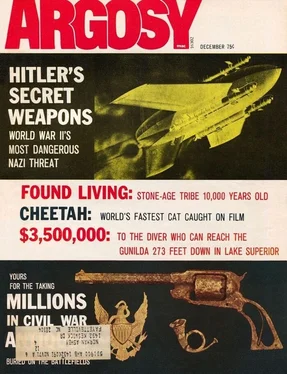Robert L. Fish
Moonlight Gardener
“And the fights! Oh, the fights! Ah, the fights!” Mrs. Williams said piously, leaning forward, her ungainly flowered hat almost toppling, her small china-blue eyes intent upon the young sergeant’s unrevealing face. “Awful! Awful! ” She paused significantly. “Especially the terrible one they had the night before last — Wednesday, it was,” she said, and paused again, almost breathlessly. “The night she disappeared,” she added meaningfully.
“Disappeared.” The sergeant started to write the word down on his lined pad and then stopped halfway to end it in a wiggly squiggle, culminated in an almost vicious dot. He wished, not for the first time, that he had chosen a different line of endeavor for his life’s work; he had a strong feeling he knew what was coming.
“Disappeared. That’s what I said,” Mrs. Williams said sharply. “She hasn’t been seen since — and that’s disappearance, isn’t it?” The edge of poorly concealed disdain tinged her voice. “And then that man trying to tell me, when I went over to borrow a cup of sugar—”
“You were out of sugar,” the sergeant murmured politely, and carefully printed the word SUGAR on his pad. He hated busybodies of all types, but particularly those like the woman facing him, and not merely because they caused the police a great deal of work that almost inevitably was pointless. He wondered how life must have been in those delightful days before neighbors-within-earshot. Beautiful, without a doubt.
Mrs. Williams’s little chin hardened. Her eyes defied him to attempt avoiding the responsibilities of his office with such flimsy tactics. Her well-tended hands clasped themselves more tightly about her purse, as if it might not be safe in this world of predators, even here in the local police station.
“ That man was trying to tell me,” she went on inexorably, a juggernaut not to be stopped, “that she was out shopping. Before eight in the morning, when the stores in town don’t open until nine!”
The sergeant made a series of little 9’s to border the mutilated DISAPPEARED and the intact SUGAR.
“And she wasn’t home all day,” Mrs. Williams declared flatly, “because I was watching. And then, this morning, I went over again, because I was worried about her, and he comes up with an entirely new story this time, about how she suddenly decided late last night to visit her sister. Which is a bit strange, since she doesn’t have a sister and I know that for a gospel fact!”
The sergeant carefully printed NO SISTER on the paper before him, boxed the words neatly with his pencil, and began shading the enclosed parallelogram. He kept his eyes from the rather pretty face of the woman across from him. At the moment, she wasn’t all that pretty.
“And how could she possibly have gone away in the middle of the night the way he said — without my hearing, I mean?” Mrs. Williams demanded. “My house is the only one nearby and I’m sure, if Mr. Jenkins had come for her in his taxi — or even if he drove her to either the train or the bus station — I would have heard.”
“I’m sure,” the sergeant said, and added under his breath, “at any hour, day or night,” and he made a series of tiny loops to border the shaded box on his pad. They intertwined with the curved 9’s very nicely.
Her blue eyes studied the expressionless face across from her and then dropped to the artistic caligraphy on the pad. Her jaw tightened dangerously, but she kept her voice under control as she brought up her heaviest artillery.
“And then last night,” she said, her tone almost vicious, “after two in the morning, he digs up one of the small peach trees in the garden, and then, fifteen minutes later — or maybe a half-hour, no more — I can hear him out there replanting it. And her gone — disappeared — more than twenty-four hours! Now,” she said, her tone, her angle of incidence, her entire bearing daring him to downgrade her testimony, “what is your smart-aleck answer to that, young man?
Does it make sense for a man to dig up a tree in the middle of the night, and then replant it a half-hour later? Does it? Well?”
The sergeant laid aside the pencil with a certain sense of reluctance and for the first time really studied the woman facing him. The spiteful expression spoiled what he knew might have been beauty under different circumstances; the faint sneer disgusted him. But he couldn’t deny the substance of her arguments.
“No,” he admitted in his drawl. “No, it doesn’t.”
“Well! I’m glad you finally realize it, young man. And the money was all hers, too,” Mrs. Williams added, almost as an afterthought. She was quite aware that the statement was anti-climactic, but she definitely wanted it included in the record of evidence.
“Money?”
“In the safe-deposit box with her jewels. The money that bought the house, even though everything is in both their names. You wait and see,” she added, leaning forward again. “He’ll be having it up for sale within a week. He never did a day’s work since they married — if he ever did one before, which I seriously doubt!”
There were several moments’ silence. The sergeant made the first move, bringing his considerable bulk to his feet, indicating the interview was over. He waited as she came to her five-feet-two-inches of height, looking up at him defiantly.
“I’ll take the matter up with the sheriff, ma’am,” he said.
“I should certainly hope so, young man,” she retorted coldly, studying him once again with eyes that were quite unimpressed. Then she marched from the station house, the fur piece about her neck seeming to hurry to catch up with her.
“I suppose we’ll have to check it out,” the sheriff said wearily. “I don’t know too many people in this town — most of my time is spent over in Bellerville at the county seat — but I do happen to know Charley Crompton. The idea of him doing away with that battle-axe he married is simply ridiculous. If he has a temper, I’ve never seen it. He’s a mouse. If it was the other way around, I might believe it. But Charley! Impossible. At any rate, it’s just a rumor from that nosy woman at this stage.”
He glanced up at the husky young sergeant. “I don’t suppose you’ve had time to do anything about it yet?”
“Well,” the sergeant said, considering, “old Sol Jenkins — he’s our taxi here — he didn’t pick her up, last night or any other time. He laughed and said he didn’t believe she ever took a taxi in her life. They cost money. And if Charley drove her, or if she walked across the fields to the station, nobody caught either the eight o’clock or the midnight train, and that’s the last one. And the ticket men at both the train and the bus station don’t remember her on any train or bus in the last two days, afternoon or night.”
“What about this Mrs. Williams’s husband?” the sheriff asked. “Mr. Williams? Does he confirm or deny it?”
“There is no Mr. Williams,” the sergeant said. His tone commended the shade of Mr. Williams for his wisdom in being the nonexistent spouse of the meddling Mrs. Williams. “She’s been a widow over four years.” He shook his head. “She’s only forty, but I think she’s been forty all her life. Doesn’t have anything to do all day except sit on the telephone or write letters to the editor of the Bugle . She’s a feminist. I gather she even had Mrs. Crompton all worked up on the stuff.”
The sheriff smiled. “But not your wife?” he said.
“Not yet, at any rate,” the sergeant said, and grinned back.
The sheriff’s smile faded. “Any other neighbors?”
“About a half-mile away, the nearest. Those two houses stand all alone at the end of the road. Around a curve from the others, as a matter of fact. They’re pretty isolated.”
Читать дальше








